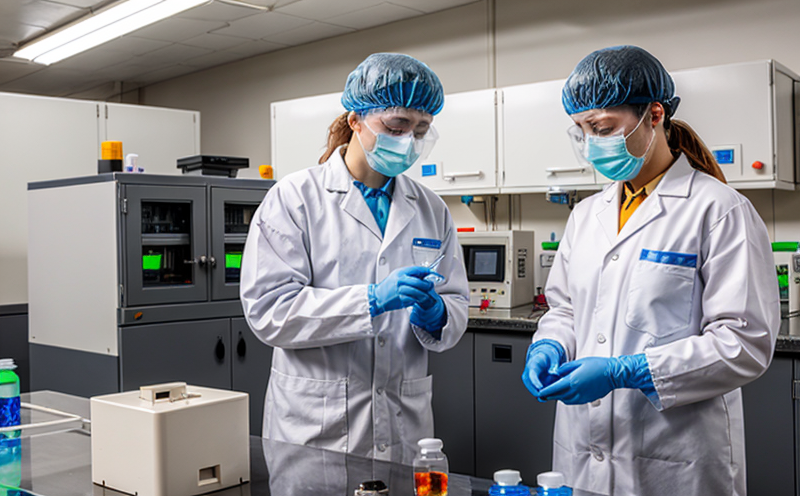EN 14908 Acrylamide Detection in Coffee Drinks
The European Standard EN 14908 outlines a procedure to determine acrylamide levels in food and feed products. This standard has been particularly important for the coffee industry, given that certain coffee drinks can contain significant amounts of acrylamide due to high-temperature processing conditions.
Acrylamide is a chemical compound that forms during the thermal processing of carbohydrates, especially when they are exposed to temperatures above 120°C. Coffee beans and roasted coffee products are not exempt from this risk, as roasting processes can lead to its formation. The presence of acrylamide in coffee drinks has raised concerns about potential health risks, particularly for consumers who drink large quantities over extended periods.
The detection method prescribed by EN 14908 involves the use of specific analytical techniques that are sensitive and reliable enough to measure even trace amounts of acrylamide. These methods include enzyme-linked immunosorbent assay (ELISA) or gas chromatography with mass spectrometry (GC-MS). The standard specifies detailed procedures for sample preparation, extraction, and analysis to ensure accurate results.
Sample preparation is a critical step in this process. Coffee drinks must be thoroughly mixed to ensure homogeneity before being processed further. Extraction methods may vary depending on the type of coffee drink and the expected acrylamide concentration. For instance, aqueous extracts are often used for analysis, which involve dissolving the sample in water under controlled conditions.
The analytical equipment required includes sophisticated instruments capable of detecting minute quantities of acrylamide. GC-MS is particularly favored due to its high sensitivity and specificity, allowing even trace amounts to be identified with precision. The standard also provides guidelines on quality control measures to ensure reproducibility and reliability of results.
Acceptance criteria for EN 14908 are stringent, aiming to protect consumer health by ensuring that acrylamide levels in coffee drinks do not exceed the specified limits. Compliance with these standards is crucial for manufacturers who wish to maintain a good reputation and avoid potential legal issues. By adhering to this standard, companies can demonstrate their commitment to safety and quality.
In conclusion, EN 14908 plays a vital role in safeguarding public health by providing a robust framework for detecting acrylamide in coffee drinks. Compliance with this standard ensures that products meet stringent regulatory requirements and provide consumers with peace of mind regarding the safety of their beverages.
Applied Standards
The primary standard applied in this testing procedure is EN 14908, which specifies the methodology for determining acrylamide levels in various food and feed products. This European Standard has been widely adopted across Europe and internationally due to its reliability and accuracy.
In addition to EN 14908, other relevant standards include ISO 21576-3, which provides additional guidance on sample preparation techniques, and IEC 62321, which covers the safety aspects of electrical equipment that may contribute to acrylamide formation. While these latter two are not directly related to acrylamide detection in coffee drinks, they provide a comprehensive approach to understanding all factors involved in minimizing acrylamide content.
The methodology described in EN 14908 is designed to be adaptable to different types of coffee drinks, whether they contain ground beans, instant powders, or other ingredients. The standard's flexibility allows laboratories to adapt the testing process according to specific product formulations and expected acrylamide concentrations.
Why Choose This Test
Choosing EN 14908 for detecting acrylamide in coffee drinks offers several advantages. Firstly, it ensures compliance with international standards, which is essential for maintaining a good reputation and avoiding potential legal issues. Compliance also demonstrates the company's commitment to safety and quality, enhancing consumer trust.
The test provides accurate results that can help companies identify and mitigate risks associated with acrylamide formation during processing. By understanding the levels of acrylamide in their products, manufacturers can make informed decisions about process optimization or ingredient substitutions if necessary.
Regular testing is crucial for maintaining consistent product quality over time. Variations in raw materials or processing conditions could lead to fluctuations in acrylamide content, necessitating continuous monitoring. EN 14908 offers a standardized approach that can be consistently applied across different batches and production lines.
The test results can also inform R&D efforts aimed at developing new formulations with lower acrylamide levels. By identifying the sources of acrylamide formation, companies can explore alternative processing methods or ingredient combinations to reduce these risks.
For compliance officers, this test provides a clear pathway to ensuring adherence to regulatory requirements without ambiguity. It offers a transparent process that can be communicated effectively to stakeholders, including regulators and consumers. This transparency builds trust and strengthens the company's brand image.
Competitive Advantage and Market Impact
Adopting EN 14908 for detecting acrylamide in coffee drinks can give companies a significant competitive advantage. By being proactive in addressing health concerns, businesses demonstrate their commitment to consumer safety, which can enhance brand reputation and customer loyalty.
In the highly competitive global market, maintaining high product standards is crucial. Compliance with international standards like EN 14908 sets a benchmark that competitors must meet or exceed. This not only elevates the company's standing but also opens up opportunities for expansion into new markets where stringent regulatory requirements are in place.
From an operational perspective, regular testing can help companies identify and rectify issues early on, preventing costly recalls and product withdrawals. Early detection allows for corrective actions to be implemented promptly, reducing disruptions to production schedules and minimizing financial losses.
The test results can also provide valuable insights into process improvements that could lead to cost savings in the long run. By optimizing processing conditions or substituting ingredients known to reduce acrylamide formation, companies can achieve better efficiency without compromising product quality.
For procurement departments, this test highlights the importance of selecting suppliers who adhere to strict standards for raw materials and processing methods. Ensuring that all components used in coffee drinks meet these criteria helps maintain consistent product quality throughout the supply chain.





